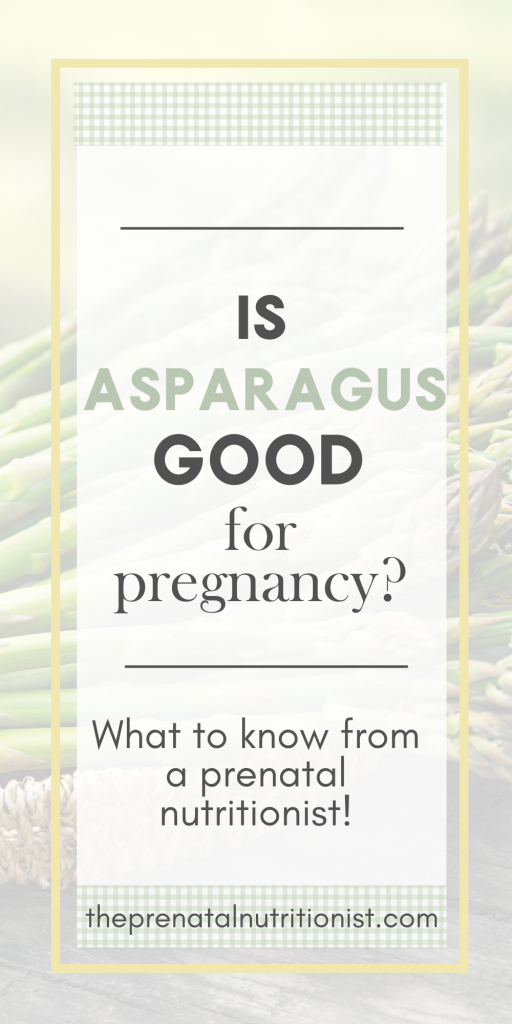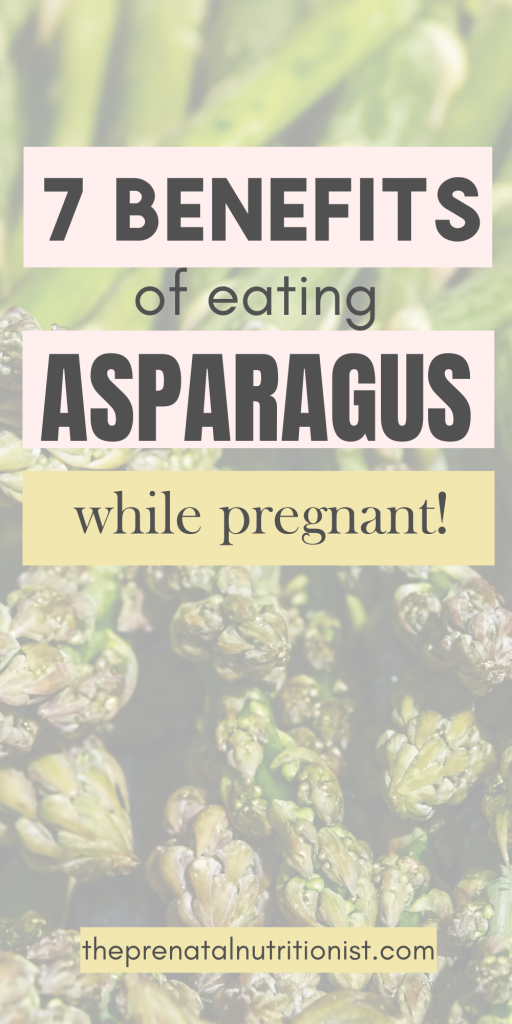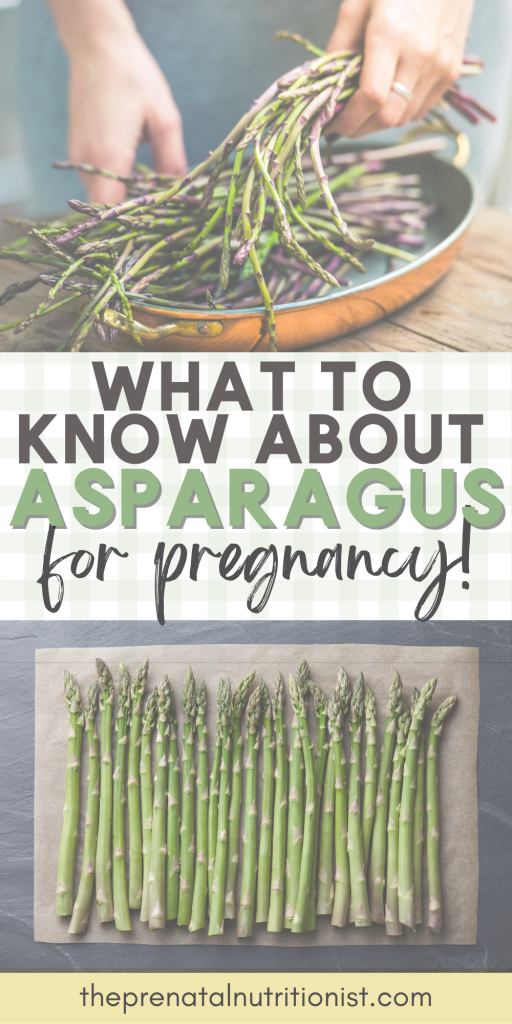
Have you ever wondered if asparagus is good for pregnancy? Well, wonder no more! At The Prenatal Nutritionist, we’ll answer all your burning asparagus questions.
If you’re curious whether or not asparagus is safe to consume during pregnancy, the answer is: YES!
This nutritious vegetable is safe to eat during pregnancy and recommended (if you enjoy it)!
Asparagus is a super versatile vegetable. Often presented as a side for grilled and baked dishes. But it can be eaten all on its own as well. It contains plenty of vitamins and minerals. And the best part is, it’s easy to cook and tastes delicious too! Depending on the variety, it can be green, white, or purple.
There are tons of ways to prepare asparagus. You can grill it with savory spices like salt and paprika, drizzled with olive oil. You can combine it with creamy pasta, topped with a squeeze of lemon juice. Or, you can add blanched asparagus to your next vibrant garden salad. Eating asparagus during pregnancy doesn’t have to be boring!
Are you looking for a standalone snack instead? Grab your baking sheet and roast asparagus in the oven. Top with shredded cheese and eat up. So many cooking methods and so many options!
Consuming these strong green stalks can benefit your pregnancy in so many ways! Read on to find out why asparagus is so good for moms-to-be!

Is Asparagus Good For Pregnancy
Asparagus isn’t just good for pregnancy; it’s excellent! With only 27 calories and 3 grams of fiber per 1 cup serving, these thick spears are filled with a powerhouse of nutrition. Vitamins and minerals galore can be found in this veggie within the recommended dietary allowance (rda)!
This vegetable is perfect for pregnant people because it contains vital nutrients required for a healthy pregnancy. Think folate, calcium, fiber, iron, vitamin C, etc.
Yes, these nutrients are required for everyone. But they are essential for women undergoing many pregnancy-related changes. This includes supporting the proper growth and development of baby.
Although asparagus is safe to consume during pregnancy, there are two things to keep in mind:
- Before cooking, thoroughly rinse and clean your asparagus. Dirt and germs can easily hide in the leafy head of an asparagus spear. So, cleanse thoroughly.
- Eat asparagus in moderation. Overeating asparagus in large amounts can lead to uncomfortable gas and bloating.
Now that you know asparagus is very safe to eat during pregnancy, let’s go over why you should add this bright green veggie to your pregnancy meal plan today!

What nutrients are in asparagus?
Asparagus is loaded with vitamins and minerals. It is high in vitamin K and a good source of thiamin and riboflavin. It is also known for its fiber, calcium, iron, niacin, folate content, and antioxidants vitamin C, A, E, and selenium.
6-7 spears of fresh, cooked asparagus provide the following:
- Calories: 21 kcal
- Protein: 2.36 g
- Fat: 0.13 g
- Carbohydrates: 4.16 g
- Fiber: 2.3 g
- Calcium: 26 mg
- Iron: 2.29 mg
- Selenium: 2.5 mcg
- Vitamin C: 5.1 mg
- Thiamin: 0.138 mg
- Riboflavin: 0.144 mg
- Folate: 47 mcg
- Vitamin A: 39 RAE
- Vitamin E: 1.21 mg
- Vitamin K: 44.6 mcg
Data from USDA Food Data Central
Asparagus is chock full of vitamins and minerals.
Consuming plenty of vitamins and minerals is essential to promote a happy and healthy pregnancy. Asparagus is a nutrient-dense vegetable. Full of folate (a.k.a vitamin B9), calcium, fiber, iron, antioxidants, magnesium, and several other nutrients. So many nutrients and wins!
Asparagus contains plenty of folate.
Asparagus is a rich source of folate. Containing 22% of the recommended daily value for pregnancy in just one 1/2 cup serving. Folate is one of the essential nutrients required during pregnancy, especially during the first trimester. This nutrient supports the healthy development of the baby’s brain and spine.
Folate is necessary to help reduce the risk of neural tube defects. Adequate intake of folate helps to reduce the risk of neural tube defects such as spina bifida and anencephaly. Folic acid is found in fortified foods, and folate is the kind naturally found in asparagus.
Asparagus supports bone and teeth formation.
Asparagus is a non-dairy source of calcium, a nutrient that supports the formation of a baby’s bones and teeth and benefits moms. Calcium benefits moms by keeping their bones and spine strong as they go through the many bodily changes associated with pregnancy. Consuming plenty of calcium outside and during pregnancy has been shown to help reduce the risk of high blood pressure.
Asparagus helps prevent constipation and keeps you regular.
Asparagus is chock full of soluble fiber, with over 2 grams per serving. Eating plenty of soluble fiber during pregnancy can help prevent common digestive symptoms that typically occur during the gestational period. These include but are not limited to constipation, hemorrhoids, and even simple bathroom irregularities.
Asparagus supports healthy digestion and metabolism.
The soluble fiber in asparagus not only helps prevent constipation and keeps you regular. But it also supports healthy digestion and metabolism. Plenty of fiber promotes good bacteria in the gut. Meaning less gas, upset stomach, and bloating. All of which are common symptoms of pregnancy. Soluble fiber also supports a healthy metabolism. Which promotes higher energy levels and healthy weight gain during pregnancy.
Asparagus promotes good immune health.
Asparagus is a source of vitamin C. Containing around 10% of the recommended daily value for pregnant women. Vitamin C is important during pregnancy because it supports your immune system. Helping your body ward off viruses, bacteria, and infections. Your immune system is slightly suppressed during pregnancy. This makes it even more important to keep your immune system as strong as possible during pregnancy.
Asparagus helps prevent disease.
Asparagus contains antioxidants such as vitamin E and vitamin C. Antioxidants help to rid the body of free radicals. This can lead to DNA damage and increase the risk of many diseases. Consuming various colorful plant foods like asparagus helps improve our overall health.
Best ways to cook asparagus
There is no one RIGHT way to cook asparagus. In fact, there are several ways to cook and enjoy asparagus during pregnancy! One of the simplest ways is to roast it in the oven with extra virgin olive oil, salt, and pepper– yep, that’s it! And it only takes about 15 minutes at 350-375 F.
Another option is to steam it, which preserves nutrients and gives it a tender texture. Grilling asparagus is also a great option, adding a smoky flavor and charred marks. Another way to cook asparagus is to sauté it in a pan with garlic, butter, and other seasonings. Finally, you can also blanch asparagus by boiling it briefly and then shocking it in ice water to preserve its bright green color and crispness.
- Roast it in the oven.
- Grill it
- Steam it
- Saute it on the stovetop
Ultimately, choosing how to cook asparagus will depend on personal preferences and the desired flavor and texture.
Can You Eat Asparagus Raw?
Yes! Asparagus is safe to eat raw. It is important to wash it thoroughly, though. One way to eat raw asparagus is to dice it into small pieces and add it to a pasta salad or shave it with a vegetable peeler and add it to any green salad.

Add asparagus to your pregnancy shopping list today!
As you can see, asparagus provides a plethora of health benefits for you and your growing baby. Because it contains so many essential nutrients, it’s a food we recommend consuming before, during, AND after pregnancy. So, add asparagus to your pregnancy shopping list today!
You’ll never tire of these yummy green stalks with many cooking options, or eat it raw if preferred! However, if you don’t enjoy asparagus, don’t worry! There are plenty of nutrient-dense foods to incorporate into your pregnancy diet.
For more blogs like this one, head to The Prenatal Nutritionist Blog. Check weekly for new and helpful content on pregnancy, nutrition, and everything.
Are you tired of conflicting Google answers?? Sign up for The Prenatal Nutrition Library today so you know what you are eating during pregnancy is safe! Access the first searchable database and app for food during pregnancy from pregnancy-registered dietitians!












